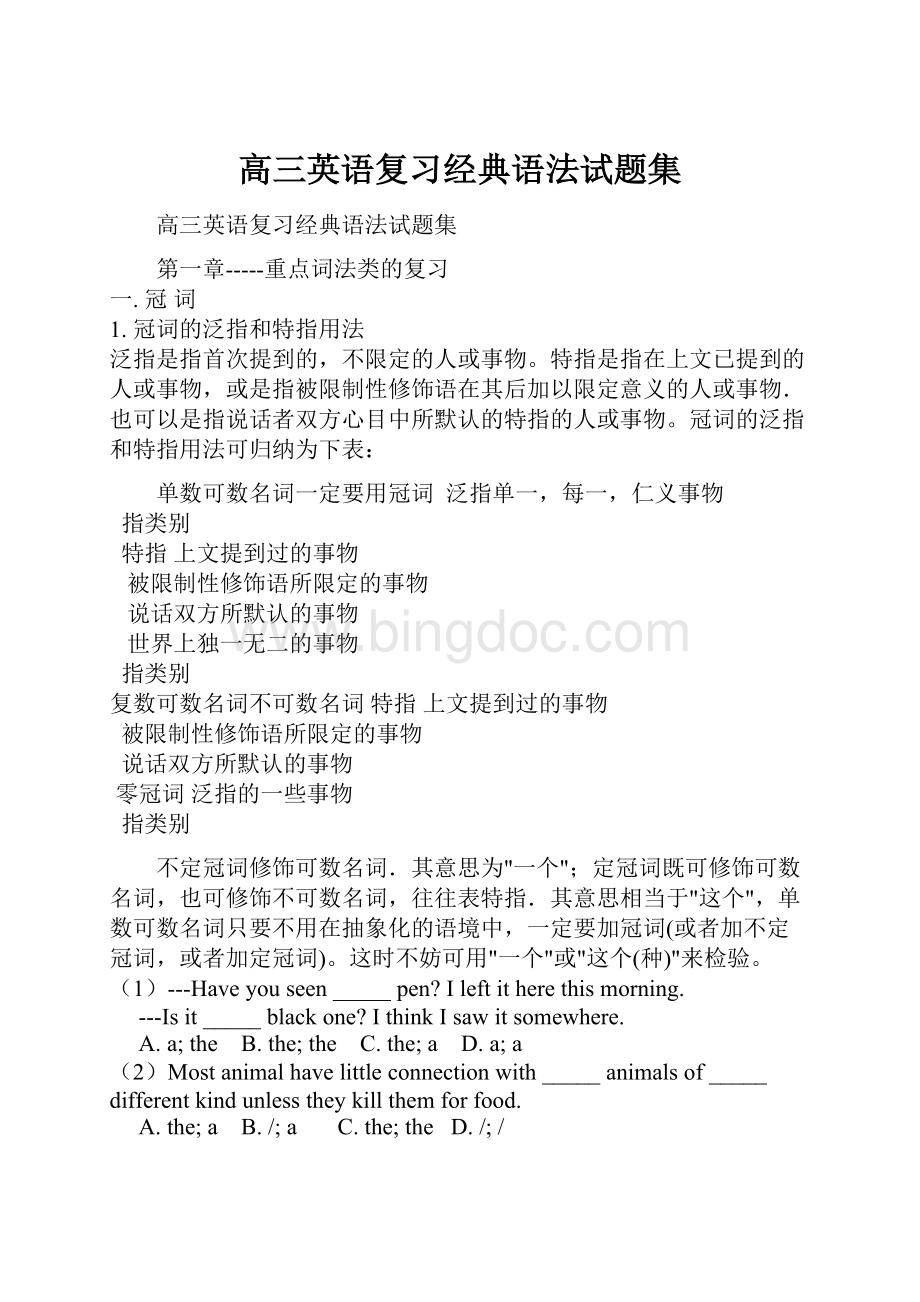高三英语复习经典语法试题集.docx
《高三英语复习经典语法试题集.docx》由会员分享,可在线阅读,更多相关《高三英语复习经典语法试题集.docx(98页珍藏版)》请在冰点文库上搜索。

高三英语复习经典语法试题集
高三英语复习经典语法试题集
第一章-----重点词法类的复习
一.冠词
1.冠词的泛指和特指用法
泛指是指首次提到的,不限定的人或事物。
特指是指在上文已提到的人或事物,或是指被限制性修饰语在其后加以限定意义的人或事物.也可以是指说话者双方心目中所默认的特指的人或事物。
冠词的泛指和特指用法可归纳为下表:
单数可数名词一定要用冠词 泛指单一,每一,仁义事物
指类别
特指上文提到过的事物
被限制性修饰语所限定的事物
说话双方所默认的事物
世界上独一无二的事物
指类别
复数可数名词不可数名词特指上文提到过的事物
被限制性修饰语所限定的事物
说话双方所默认的事物
零冠词泛指的一些事物
指类别
不定冠词修饰可数名词.其意思为"一个";定冠词既可修饰可数名词,也可修饰不可数名词,往往表特指.其意思相当于"这个",单数可数名词只要不用在抽象化的语境中,一定要加冠词(或者加不定冠词,或者加定冠词)。
这时不妨可用"一个"或"这个(种)"来检验。
(1)---Haveyouseen_____pen?
Ileftitherethismorning.
---Isit_____blackone?
IthinkIsawitsomewhere.
A.a;the B.the;the C.the;a D.a;a
(2)Mostanimalhavelittleconnectionwith_____animalsof_____differentkindunlesstheykillthemforfood.
A.the;a B./;a C.the;the D./;/
2.不定冠词a(n)的几种特殊用法
(1)不定冠词a(n)用于有或没有形容词修饰的抽象名词前。
ManypeopleagreedthataknowledgeofEnglishisamustininternationaltradetoday.
许多人都持相同的看法,在当前国际贸易交往中,英语知识是必备的知识。
(2)不定冠词s(n)用于有形容词修饰的一日二餐前。
BeforeIgotoworkeverymorning,I'vealightbreakfast.
我每天早晨上班前.吃点简单的早餐。
(3)不定冠词a(n)用于有形容词修饰的季节、日期前。
ThetrafficaccidenthappenedonaSundaytowardstheendofJuly.
车祸是7月底的一个星期天发生的。
(4)不定冠词a(n)用于序数词前,表示一次,又一。
Howimportantitistolearnasecondlanguage!
再学一门语言是多么重要啊!
(5)不定冠词a(n)表示"per"的意思。
Hisincomeisonethousandyuanamonth.
他的月收入是1000元。
(6)不定冠词a(n)用于有good/greatmany修饰的名词复数前。
I'vevisitedtheGreatWallagoodmanytimes.
我参观过长城好多次。
'
(7)不定冠词a(n)用于形式为复数,但意义仍为单数的名词前。
Athousandmilesisagooddistance.
一千英里是相当远的距离。
(8)不定冠词a(n)用于一些原来是动词的名词前。
Let'shaveawalkaroundtheplaygroundaftersupper.
晚饭后,让我们围着操场散步吧!
(9)有一些抽象名词:
advice(忠告),behavior(行为),fortune(运气),fun(娱乐),information(情报),progress(进步),damage(损害),harm(伤害)等,即使被形容词修饰,也不加不定冠词。
KarlMarxgaveussomeadviceonhowtolearnforeignlanguagewell.
卡尔·马克思就怎样学好外语,提出了许多建议。
(10)用在某些固定词组中。
Afew,alittle,alotof,abit,acoupleof,allofasudden(突然),asamatteroffact(实际上),inahurry(匆忙的),inaword(简言之),haveagoodtime(玩得愉快),dosb.afavour(帮忙),payavisitto(访问),asarule(惯例),asawhole(总之),inadayortwo(一两天),inaway(在某种程度上),ofasize(大小相同),haveawordwithsb.(与…交谈),makealiving(谋生),takeapridein(自豪),takeawalk(break,bath,seat)(散步(休息、洗澡、就座)),agreatdealof(大量),beapity(遗憾),haveacold(headache,fever)(感冒(头痛、发烧)),manya(许多),catchacold(感冒).
3.用冠词与不用冠词的差异
在某些习惯用语中,用还是不用冠词,意义不同,有时甚至差别很大,使用时要特别注意。
attable进餐
atthetable在桌子旁
inhospital住院
inthehospital在医院里
bysea乘船(由海路)
bythesea在海边
gotosea当水手
gotothesea去海边
infuture从今以后,将来
inthefuture未来
onearth究竟
ontheearth在地球上,在世上
gotoschool(church…)上学(做礼拜…)
gototheschool(church…)到学校(教堂)去
infrontof在…(外部的)前面
inthefrontof在…(内部的)前面
onhorseback骑着马
onthehorseback在马背上
takeplace发生
taketheplaceof代替
twoofus我们当中的两人
thetwoofus我们两人(共计两人)
outofquestion毫无疑问,一定
outofthequestion不可能
onthewhole=ingeneral大体上,一般地
asawhole=altogether全部地,整体
Amostimportantmeeting一个重要的会议
themostimportantmeeting最重要的会议
Athirdtime又一次
thethirdtime第三次
atadistance稍远一些
inthedistance在远处
Anumberof许多
thenumberof…的数目
foramoment一会儿
forthemoment目前,暂时
beinchargeof负责…
beinthechargeof由…负责,在…掌管之下
byday在白天
bytheday按日计算
inpossessionof拥有
inthepossessionof为…所有
insightof能看见
inthesightof据…的见解
inplaceof代替
intheplaceof在…的地方
beofage成年
beofanage同龄
takeadvice征求意见
taketheadvice听从劝告
Heisstillinoffice.他仍在执政
Heisstillintheoffice.他仍在办公室里
1.Papermoneywasin_____useinChinawhenMarcoPolovisitedthecountryin_____thirteenthcentury.
A.the;/ B.the;the C./;the D./;/
2.Itisnotrarein_____thatpeoplein_____fiftiesaregoingtouniversityforfurthereducation.
A.90s;their B.the90s;/ C.90s;. D.the90s;their
3.Summerin_____southofFrancearefor_____mostpartdryandsunny.
A./;a B.the;/ C./;/ D.the;the
4.Mostanimalshavelittleconnectionwith_____animalsof_____differentkindunlesstheyhunt
themforfood.
A.the;a B./;a C.the;the D./;he
5.Mr.Smith,there'samanat_____frontdoorwhosayshehas_____newsforyouofgreat
importance.
A.file:
/ B.the;the C./;/ D./;the
6.Thewarmthof_____sweaterwillofcoursebedeterminedbytheshortof_____woodused.
A.the;file B.die;/ C./;/ D./;/
7.Abullethitthesoldierandhewaswoundedin_____leg.A.a Bone C.the D.his
8.Idon'tliketalkingon_____telephone.Ipreferwriting_____letters.A.a;the B.the;/ C.the;the D.a;/
9.Jumpingoutof_____airplaneattenthousandthatisquite_____.excitingexperience.
A./;the B./;an C.an;an D.the;the
10.Onewaytounderstandthousandsofnewwordsistogaingoodknowledgeofbasicword
formation.A./ B.the C.a D.one
11.Thecakesaredelicious.He'dliketohave_____thirdonebecause_____secondoneisrathertoo
small
A.a;a B.the;the C.a;the D.the;a
12.There's_____dictionaryon_____deskbyyourside.
A,a;the B.a;a C.the;a D.the;the
13.---Whereismyblueshirt?
---It'sinthewashingmachine.Youhavetowear_____differentone.
A.any B.the C.a D.other
14.Thesignreads"Incaseof_____fire,breaktheglassandpush_____redbutton.
A./;a B./;the C.the;the D.a;a
15.Iearn10dollars_____houras_____supermarketcashieronSaturdays.
A.a;an B.the;a C.an;a D.an;the
*2006全国各省市高考试卷中的冠词试题:
1.(全国卷I)30.-Hello,couldIspeaktoMr.Smith?
-Sorry,wrongnumber.Thereisn't______Mr.Smithhere.
A.不填 B.a C.the D.one
2.(全国卷2)19.Iknowyoudon'tlike_______musicverymuch.Butwhatdoyouthinkof_______musicinthefilmwesawyesterday?
A./;/B.the;theC.the;/D./;the
3.(北京卷)26.---Iknockedovermycoffeecup.Itwentrightover______keyboard.
---Youshouldn'tputdrinksnear________computer.
A.the;不填B.the;aC.a;不填D.a;a
4.(重庆卷)25.Everywheremanhascutdown_______forestsinordertogrowcrops,ortouse______woodasfuelorasbuildingmaterial.
A.the;the B.the;/ C./;the D./;/
5.(辽宁卷)21.Ofall reasonsformydecisiontobecomeauniversityprofessor,myfather'sadvicewas mostimportantone.
A.the;a B.不填;a C.不填;the D.the;the
6.(陕西卷)15.Accordingto_________WorldHealthOrganization,healthcareplansareneededinallbigcitiestoprevent_________spreadofAIDS.
A.the;不填 B.the;the C.a;a D.不填;the
7.(湖南卷)22.In___________reviewof44studies,Americanresearchersfoundthatmenandwomenwhoatesixkeyfoodsdailycuttheriskof___________heartdiseaseby76%.
A.a;the B.the;a C.a;不填 D.不填;a
8.(浙江卷)3.Don'tworryifyoucan'tcometo_____party.---I'llsave_____cakeforyou.(+代词)
A.the;someB.a;muchC.the;anyD.a;little
9.(山东卷)21.Forhim____stageisjust___meansofmakingaliving.
A.a;a B.the;a C.the;the D.a;the
Keys:
1-5BDBCDBCAB
二.名词
▲一、考点聚焦
1.可数名词单、复数变化形式
(1)规则变化。
①单数名词词尾直接加-s。
如:
boy-boys,pen-pens。
②以s、x、ch、sh结尾的单词一般加-es。
如:
glass-glasses,box-boxes,watch-watches,brush-brushes。
特例:
stomach-stomaches。
③以"辅音字母+y"结尾的变"y"为"i"再加"-es"。
如:
baby-babies,lady-ladies,fly-flies。
④以"o"结尾的多数加-es。
如:
tomato-tomatoes,potato-potatoes,hero-heroes。
但以两个元音字母结尾的名词和部分外来词中以o结尾的词只加-s。
如:
radio-radios,zoo-zoos,photo-photos,piano-pianos,kilo-kilos,tobacco-tobaccos。
⑤以"f"或"fe"结尾的名词复数形式变"f"或"fe"为"v",之后再加-es。
如:
wife-wives,life-lives,knife-knives,wolf-wolves,self-selves,leaf-leaves等。
特例:
handkerchief-handkerchiefs,roof-roofs,chief-chiefs,gulf-gulfs,belief-beliefs,cliff-cliffs。
⑥改变元音字母的。
如:
man-men,mouse-mice,foot-feet,
woman-women,tooth-teeth,goose-geese,ox-oxen。
特例:
child-children。
⑦复合名词的复数形式。
(A)在复合词中最后名词尾加-s。
如:
armchair-armchairs,bookcase-bookcases,bookstore-book-
stores。
(B)man和woman作定语修饰另一个名词时,前后两个名词都要变成复数。
如:
mandoctor-mendoctors,womandriver-womendri-
vers。
(C)与介词或副词一起构成的复合名词应在主体名词部分加-s。
如:
brother-in-law-brothers-in-law,passer-by-passers-by。
⑧有的名词有两种复数形式。
如:
zero-zeros、zeroes,deer-
deers、deer。
penny的两种复数形式含义有所不同。
如:
pence(便士的钱数),pennies(便士的枚数)。
(2)不规则变化。
①单、复数同形。
如:
means,aircraft,deer,fish,Chinese,
Japanese,sheep,works(工厂),cattle。
②合成名词的复数。
如:
boy-friend-boy-friends,go-between-go-betweens(中间人),grown-up-grown-ups。
③有些名词通常只用作复数。
如:
glasses眼镜,clothes衣服,goods
货物,trousers裤子,belongings所有物,wages工资,riches财富,surroundings环境,ashes灰尘,campasses圆规,cattle家畜,congratulations祝贺,havewordswithsb.同某人吵架,inhighspirits以很高热情地,giveone'sregardstosb.向某人问侯,inrags衣衫破烂,Itisgoodmannerstodosth.有礼貌做某事。
④集体名词的数。
有些集体名词通常只用作复数,如:
people,
cattle,police;有些名词只用作单数,如:
machinery,furniture,mankind,jewellery;有些名词既可用作单数又可用作复数,单数看做整体,复数看做集体的各个成员。
如:
Thecrewislarge.船员人数很多(指整体);Thecrewarealltired.船员们都累坏了(个体)。
2、不可数名词的数
(1)一般说来抽象名词为不可数名词,但当抽象名词表示具体的东西时,可用作可数名词且词义发生变化,主要类型如下:
①抽象名词表示具有某种特性、状态、感情情绪的人或事。
如:
抽象名词(不可数) 具体化(个体名词,可数名词)
insurprise惊讶地 asurprise一件令人惊讶的事
winsuccess获得成功 asuccess一个(件)成功的人(事)
winhonor赢得荣誉 anhonor一个(件)引以为荣的(事)
Failure(失败)isthemotherofsuccess afailure失败者
失败是成功之母。
byexperience靠经验 anexperience一次经历
youth青春